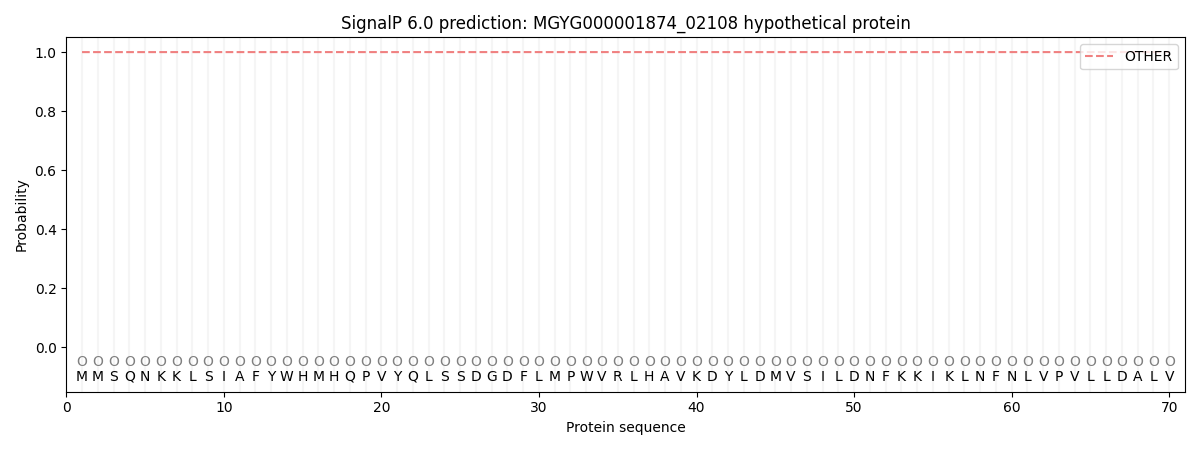You are browsing environment: HUMAN GUT
CAZyme Information: MGYG000001874_02108
You are here: Home > Sequence: MGYG000001874_02108
Basic Information |
Genomic context |
Full Sequence |
Enzyme annotations |
CAZy signature domains |
CDD domains |
CAZyme hits |
PDB hits |
Swiss-Prot hits |
SignalP and Lipop annotations |
TMHMM annotations
Basic Information help
| Species | QAMI01 sp900554095 | |||||||||||
|---|---|---|---|---|---|---|---|---|---|---|---|---|
| Lineage | Bacteria; Cyanobacteria; Vampirovibrionia; Gastranaerophilales; Gastranaerophilaceae; QAMI01; QAMI01 sp900554095 | |||||||||||
| CAZyme ID | MGYG000001874_02108 | |||||||||||
| CAZy Family | GH57 | |||||||||||
| CAZyme Description | hypothetical protein | |||||||||||
| CAZyme Property |
|
|||||||||||
| Genome Property |
|
|||||||||||
| Gene Location | Start: 2894; End: 5125 Strand: - | |||||||||||
CAZyme Signature Domains help
| Family | Start | End | Evalue | family coverage |
|---|---|---|---|---|
| GH57 | 11 | 466 | 9.3e-82 | 0.8198433420365535 |
CDD Domains download full data without filtering help
| Cdd ID | Domain | E-Value | qStart | qEnd | sStart | sEnd | Domain Description |
|---|---|---|---|---|---|---|---|
| cd10796 | GH57N_APU | 1.91e-99 | 10 | 449 | 1 | 312 | N-terminal catalytic domain of thermoactive amylopullulanases; glycoside hydrolase family 57 (GH57). Pullulanases (EC 3.2.1.41) are capable of hydrolyzing the alpha-1,6 glucosidic bonds of pullulan, producing maltotriose. Amylopullulanases (APU, E.C 3.2.1.1/41) are type II pullulanases which can also degrade both the alpha-1,6 and alpha-1,4 glucosidic bonds of starch, producing oligosaccharides. This subfamily includes GH57 archaeal thermoactive APUs, which show both pullulanolytic and amylolytic activities. They have an acid pH optimum and the presence of Ca2+ might increase their activity, thermostability, and substrate affinity. Besides GH57 thermoactive APUs, all mesophilic and some thermoactive APUs belong to glycoside hydrolase family 13 with catalytic features distinct from GH57. This subfamily also includes many uncharacterized proteins found in bacteria and archaea. |
| COG1449 | COG1449 | 7.99e-82 | 6 | 562 | 2 | 521 | Alpha-amylase/alpha-mannosidase, GH57 family [Carbohydrate transport and metabolism]. |
| pfam03065 | Glyco_hydro_57 | 2.39e-39 | 11 | 424 | 1 | 282 | Glycosyl hydrolase family 57. This family includes alpha-amylase (EC:3.2.1.1), 4--glucanotransferase (EC:2.4.1.-) and amylopullulanase enzymes. |
| cd01022 | GH57N_like | 8.59e-28 | 176 | 450 | 62 | 313 | N-terminal catalytic domain of heat stable retaining glycoside hydrolase family 57. Glycoside hydrolase family 57(GH57) is a chiefly prokaryotic family with the majority of thermostable enzymes coming from extremophiles (many of these are archaeal hyperthermophiles), which exhibit the enzyme specificities of alpha-amylase (EC 3.2.1.1), 4-alpha-glucanotransferase (EC 2.4.1.25), amylopullulanase (EC 3.2.1.1/41), and alpha-galactosidase (EC 3.2.1.22). This family also includes many hypothetical proteins with uncharacterized activity and specificity. GH57s cleave alpha-glycosidic bonds by employing a retaining mechanism, which involves a glycosyl-enzyme intermediate, allowing transglycosylation. |
| COG1543 | COG1543 | 5.46e-10 | 181 | 528 | 112 | 474 | Predicted glycosyl hydrolase, contains GH57 and DUF1957 domains [Carbohydrate transport and metabolism]. |
CAZyme Hits help
| Hit ID | E-Value | Query Start | Query End | Hit Start | Hit End |
|---|---|---|---|---|---|
| AOR38601.1 | 0.0 | 1 | 742 | 1 | 740 |
| ACI20270.1 | 2.19e-151 | 8 | 716 | 3 | 673 |
| QDZ40903.1 | 1.61e-144 | 8 | 732 | 5 | 730 |
| QGZ90793.1 | 1.26e-143 | 8 | 742 | 5 | 745 |
| ACB51797.1 | 4.26e-143 | 8 | 741 | 33 | 775 |
PDB Hits download full data without filtering help
| Hit ID | E-Value | Query Start | Query End | Hit Start | Hit End | Description |
|---|---|---|---|---|---|---|
| 2B5D_X | 1.77e-07 | 159 | 496 | 93 | 464 | Crystalstructure of the novel alpha-amylase AmyC from Thermotoga maritima [Thermotoga maritima MSB8] |
Swiss-Prot Hits help
SignalP and Lipop Annotations help
This protein is predicted as OTHER

| Other | SP_Sec_SPI | LIPO_Sec_SPII | TAT_Tat_SPI | TATLIP_Sec_SPII | PILIN_Sec_SPIII |
|---|---|---|---|---|---|
| 1.000025 | 0.000008 | 0.000001 | 0.000000 | 0.000000 | 0.000000 |
